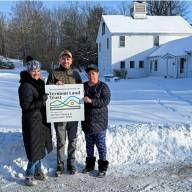Waitsfield is awaiting the release of a federal funding package that will pave the way for its long-planned municipal wastewater project to move into the next phase. Once approved, the town will begin creating requests for proposals (RFPs) to solicit bids for construction and implementation.
According to town administrator York Haverkamp, the funding is expected to come through the U.S. Department of Agriculture’s Rural Development Service (USDA), and it includes a combination of loans and grants. The package had initially been anticipated last week, but Haverkamp said the town was recently informed it would be receiving additional funds made available from other USDA projects that failed to advance.
“We were surprised but pleased to learn that extra funds had opened up, and that Waitsfield is in line to benefit,” Haverkamp said. “It strengthens our position and gives us a clearer path to move forward.” Waitsfield’s project is at the 60% phase for final design.
While the final funding details are still being finalized, the town is already taking steps to secure critical components of the wastewater system. On July 28, Waitsfield signed a contract with Aqua-Aerobic Systems, Inc., a wastewater technology firm, for the pre-purchase of a two-basin Sequencing Batch Reactor (SBR) system. The contract is valued at $615,630.
Under the terms of the agreement, Aqua-Aerobic will furnish all necessary equipment, piping, controls, appurtenances, and provide technical support, testing and startup services. The SBR system will serve as the treatment backbone of the Waitsfield Community Wastewater System. If needed, the agreement also includes provisions for an effluent filtration system. This system is part of what will be a tertiary treatment plant at the town-owned Munn Field.
The price in the contract will be held constant for an eight-month period following the effective date. After that, costs may be adjusted based on the Engineering News-Record (ENR) Construction Cost Index, depending on when the equipment is formally assigned to the general contractor. The final construction contract, including the SBR system, will be awarded following a competitive bidding process, anticipated in fall 2025.
The contract was signed in coordination with DuBois & King, Inc., the town’s engineering consultant, which is also providing oversight and guidance throughout the project’s planning and design phases.
The wastewater project, which has been under development for several years, is intended to address longstanding environmental concerns related to septic capacity and groundwater quality. It will also support future economic development and infrastructure resilience in the town center and surrounding areas. The system is expected to cost $15 million and the town has already received state funding for all planning and engineering, with the help of some town ARPA funds. Additionally, the town has received state funding and is now awaiting the USDA funding. The system will serve Irasville and Waitsfield.
MULTI-USE PATH
In addition to the wastewater system, Waitsfield is also exploring how a multi-town shared-use path might be constructed alongside (and at the same time) as the wastewater lines. The path is part of a broader co-location effort that aims to reduce costs and minimize construction disruption by integrating transportation and utility infrastructure.
The design cost for the shared-use path and wastewater co-location is estimated at $210,000, according to DuBois & King. To support this component, the town is preparing to apply for funding through the Federal Rural and Tribal Assistance (RTA) Program, which opens for applications on September 8.
The RTA program is a grant opportunity specifically targeted toward rural and tribal communities. It provides funding for transportation planning and design activities, including financial analysis, feasibility studies, and regulatory review. Awards range from $250,000 to $2.5 million, and no local match is required. Approved projects must be completed within a 36-month window.
At an upcoming meeting, the board is expected to vote on a motion authorizing Haverkamp to sign the RTA grant application and related documents on the town’s behalf. The proposal will be subject to final review by both Haverkamp and the board prior to submission.
If awarded, the RTA grant would significantly reduce upfront design costs and accelerate the timeline for integrating the shared-use path into the wastewater project.
“We see this as an opportunity to maximize investment and minimize disruption by doing both projects together,” Haverkamp said. “It’s a chance to build smarter, not just bigger.”
Construction on the wastewater system is expected to begin in 2026, following the selection of a general contractor and completion of design and permitting.













